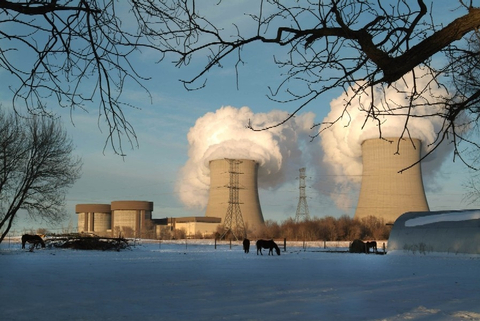Largest nuclear operator calls for renewed focus on reliability measures after nearly a quarter of PJM generation goes offline, resulting in up to $2 billion in penalties for generators that failed to produce during Winter Storm Elliott
Nuclear plants operated by Constellation (Nasdaq: CEG) performed at 100 percent capacity and proved instrumental in preventing rolling blackouts for millions of homes and businesses during a powerful winter storm that knocked nearly a quarter of the power generation in the nation’s largest energy grid offline on Christmas Eve. PJM, the grid operator for 13 states and the District of Columbia, said generators that failed to perform during Winter Storm Elliott face penalties totaling as much as $2 billion, a record amount that raises questions about whether generators are taking sufficient steps to make their resources reliable in a changing climate. PJM began notifying generators of their potential penalties this past week.
This press release features multimedia. View the full release here: https://www.businesswire.com/news/home/20230223005697/en/

Nuclear plants operated by Constellation performed at 100 percent capacity and proved instrumental in preventing rolling blackouts for millions of homes and businesses during a powerful winter storm that knocked nearly a quarter of the power generation in the nation’s largest energy grid offline on Christmas Eve. (Photo: Business Wire)
The grid operator reported that 90 percent of the outages were among fossil power plants, which experienced equipment failures and fuel shortages during Winter Storm Elliott. PJM issued conservation alerts and exhausted its available emergency procedures, coming perilously close to resorting to rolling brownouts and blackouts to keep the grid up.
The storm was the first major test of the capacity performance policies implemented by PJM starting in 2016 in response to the Polar Vortex, which similarly caused 22 percent of PJM’s generation to go offline in 2014. Since that time, PJM customers have paid generators approximately $58 billion in capacity performance payments intended to spur generators to invest in reliability measures to prevent outages during extreme weather events. Despite those payments, the grid experienced an even greater level of outages during Elliott. The policy includes stiff penalties for generators that fail to perform when needed and bonuses for those that overperform, as Constellation’s fleet has throughout this winter season.
“While we’re proud of our performance this winter, these unacceptable grid-wide failures are clear evidence that PJM still has work to do to keep the grid clean and reliable as climate risks increase,” said Joe Dominguez, president and CEO of Constellation. “Electricity markets severely undervalue the unmatched reliability and carbon-free benefits of nuclear energy, and in recent years that shortcoming nearly led to the premature retirement of more than a dozen reactors in the PJM region. If state lawmakers had not stepped in to preserve those plants, millions of families could have been forced to celebrate the holidays in a deep freeze without electricity and heat.”
Constellation operates eight nuclear plants with 16 reactors in the PJM region, generating carbon-free power for the equivalent of more than 11.6 million average homes. All 16 reactors ran at 100 percent power as temperatures fell during Winter Storm Elliott. These plants also were among the most reliable energy resources on the grid throughout 2022.
Combined, the Constellation plants that were preserved in the PJM region produce nearly 16,000 megawatts of energy. By comparison, PJM came within about 5,000 megawatts of experiencing rolling blackouts on Christmas Eve in a grid with a load of 160,000 megawatts, leaving a margin of just 3 percent.
“Bipartisan state policies, as well as the recently passed federal Inflation Reduction Act, exist because lawmakers recognized the importance of nuclear energy to protecting our nation’s energy security and addressing the climate crisis at the lowest cost to consumers,” Dominguez said. “While PJM’s capacity performance policy was a good start, it shouldn’t still fall to state and federal environmental laws to make up for electricity markets that don’t deliver reliable results for customers. We need to keep that in sight as we consider solutions to prevent another crisis like we just experienced over the holidays.”
About Constellation
Headquartered in Baltimore, Constellation Energy Corporation (Nasdaq: CEG) is the nation’s largest producer of clean, carbon-free energy and a leading supplier of energy products and services to businesses, homes, community aggregations and public sector customers across the continental United States, including three fourths of Fortune 100 companies. With annual output that is nearly 90 percent carbon-free, our hydro, wind and solar facilities paired with the nation’s largest nuclear fleet have the generating capacity to power the equivalent of 15 million homes. We are further accelerating the nation’s transition to a carbon-free future by helping our customers reach their sustainability goals, setting our own ambitious goal of achieving 100 percent carbon-free generation by 2040, and by investing in promising emerging technologies to eliminate carbon emissions across all sectors of the economy. Follow Constellation on LinkedIn and Twitter.
View source version on businesswire.com: https://www.businesswire.com/news/home/20230223005697/en/
Contacts
Paul Adams
Constellation Communications
410-470-9700
paul.adams@constellation.com



